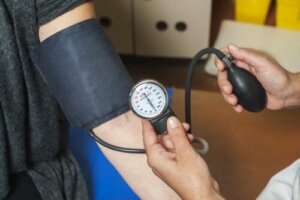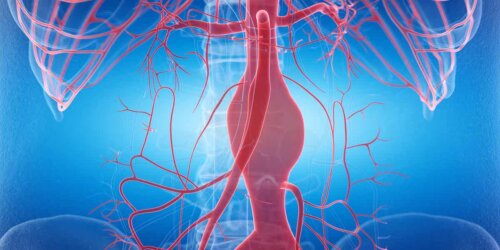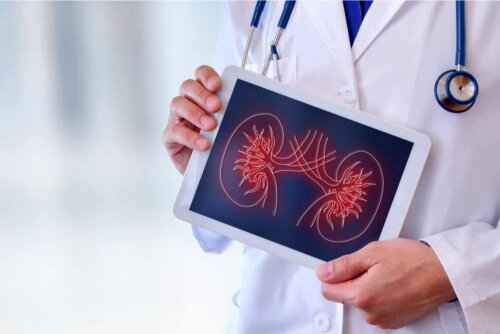The Consequences of High Blood Pressure in the Body


Written and verified by the biologist Samuel Antonio Sánchez Amador
The consequences of high blood pressure (or hypertension) are serious and chronic.
In fact, this condition significantly increases the risk of heart disease, encephalopathy, kidney disease, and others. Estimates indicate that a sixth of the world’s population has hypertension. Also, that one out of every four adults over the age of 18 is hypertensive in the most affected countries around the world.
In contrast to the alarming data, note that only one in five people with hypertension have the problem under control. As you can imagine, it’s an important trigger for various long-term disorders.
Keep reading to learn more about how high blood pressure affects the body.
What’s hypertension and how does it affect the body?
The main characteristic of hypertension is sustained high blood pressure in the systemic arteries. It’s commonly divided into the following two values:
- Systolic pressure is the maximum pressure exerted by the blood on the artery wall when the heart contracts. The limit value to rule out hypertension is 140 millimeters of mercury (mmHg), but the normal value is 120 mmHg. A person above 180 mmHg requires immediate medical attention.
- Diastolic pressure is the blood pressure measured when the ventricles of the heart relax. The normal value is equal to or less than 80 mmHg. It’s hypertension at 90 mmHg and a reason for admission to the emergency room at 120 mmHg.
Thus, the cut-off point is 140/90 mmHg. In any case, as the HHS Public Access portal indicates that 95% of patients have heterogeneous essential hypertension. There are many triggers and genetic and environmental conditioning factors.
According to Fundación Española del Corazón, hypertension kills 7.5 million people worldwide every year. It represents 13% of all deaths that occur globally each year if you see it from this perspective.
Find out How to Change Your Lifestyle if You Have Hypertension
1. High blood pressure in the heart and circulatory system
The walls of the arteries slowly but progressively become more and more damaged as the disease progresses. The Mayo Clinic points out that the development of this condition is usually silent in the early stages. Still, its effects are quite devastating.
Arteries
The walls of the arteries weaken over time due to the continuous pressure on them, and their diameter narrows due to lipid deposition and platelet accumulation. This process is what we refer to as atherosclerosis and is often the cause of most ischemic strokes and other circulatory failures.
In addition, hypertension promotes the development of aneurysms. The U.S. National Library of Medicine defines these formations as an abnormal widening of the walls of an artery. They resemble a hanging grape cluster.
Some aneurysms are congenital, while others develop from smoking, hypertension, or high cholesterol. Aneurysms can rupture and flood the surrounding tissues with blood or, alternatively, remain silent and cause no problems in a person’s life.
A ruptured aortic aneurysm is deadly. In fact, eighty percent of patients die from it — half of them before they reach the hospital.

Heart
High blood pressure causes cardiac hypertrophy. The heart must pump harder to get blood to all tissues because of arterial narrowing and damage.
Like any muscle that’s continuously overloaded, cardiac tissue eventually thickens pathologically.
The heart not only thickens in the most severe stages but its chambers dilate. As a result, it becomes increasingly difficult for this organ to pump blood, leading to various hypertensive heart diseases. Furthermore, it results in angina pectoris, heart failure, heart attacks, and strokes.
2. Consequences of high blood pressure on the brain and nervous system
There is interesting information that correlates the brain with high blood pressure. The overall blood flow to the brain can be succinctly reduced in hypertensive patients and can translate into memory loss in the long run.
The aforementioned source places hypertension as the main modifiable vascular risk factor for dementia. Beyond this, as we mentioned above, the reduction in blood flow promotes the appearance of an ischemic stroke. In fact, it’s responsible for 80% of strokes.
In this situation, the neurons that receive blood from the blocked or narrowed artery no longer receive the oxygen they need. Thus, they die within minutes. It’s also likely that hypertension leads to a hemorrhagic stroke due to the aneurysms we spoke about above.
3. Hypertension and vision
As indicated by the US National Library of Medicine, the consequences of high blood pressure can cause damage to the blood vessels that irrigate the retina. You may not be aware of it but the retina is in charge of projecting images to the nerve. It carries them to the brain. Thus, retinal damage can be harmful to vision.
For example, the optic nerve will irreversibly atrophy if not enough blood reaches the eyes. The damage to this nerve cannot be fixed, so the only possible treatment is to keep it from happening.
In addition, hypertension also causes damage to the fragile blood vessels surrounding the retina. Moreover, it increases their permeability and so blood leaks out as a consequence.
A person with hypertension might experience hemorrhages and ocular effusions that’ll permanently damage the flooded tissues.
4. Consequences of high blood pressure on the urinary system
As the website Go Red for Women points out, high blood pressure is the second leading cause of kidney failure worldwide. This is probably because hypertension narrows and hardens the blood vessels in the nephrons (basic units of the kidneys).
This is usually evidenced by a clinical event known as proteinuria. A person with this condition excretes protein in the urine.
Thus, urine protein levels greater than or equal to 300 milligrams in 24 hours could be a sign of persistent renal failure. In addition, damaged renal vessels may not filter waste substances the body should excrete. As you can see, the accumulation of toxic agents in the body can manifest itself in many ways.

5. Other associated medical conditions
The effects of hypertension on the body don’t end with damage to the renal system. The following list contains other complications that may result from it:
- Problems in the musculoskeletal system. The kidney damage allows calcium to pass into the urine and gets rid of it in the wrong way. Thus, to compensate for the deficiency of calcium in the blood (hypocalcemia), bone cells may resort to resorbing bone tissue. It leads to osteoporosis.
- Respiratory system. The reduction in the diameter of the arteries may encourage the development of a thrombus. Furthermore, it becomes an embolus if it breaks loose and begins to travel through the bloodstream. Then, a condition known as pulmonary embolism occurs when the embolus reaches a critical vessel in the lungs and impedes flow.
- Sexual failure. The penis requires fast and effective blood flow for an erection to take place. As you can imagine, hypertension leads to erectile dysfunction in men.
Read about how Sports Help Control Your Blood Pressure
Two ways to prevent the consequences of high blood pressure
Hypertension requires treatment on two different fronts: pharmacological and behavioral.
We can’t tell you that lowering blood pressure when you’re hypertensive can be done only by paying attention to your lifestyle. Therefore, you might have to take antihypertensive drugs, such as diuretics or adrenergic blockers for the rest of your life.
Apart from pharmacology, helping reduce symptoms is also in the hands of a patient. They can do so through regular exercise, weight loss if overweight, quit smoking, avoiding stressful situations, and psychological therapy.
Know that you’re not alone in the fight against the consequences of high blood pressure.
All cited sources were thoroughly reviewed by our team to ensure their quality, reliability, currency, and validity. The bibliography of this article was considered reliable and of academic or scientific accuracy.
- Hypertension, HHS Public Access. Recogido a 20 de abril en https://www.ncbi.nlm.nih.gov/pmc/articles/PMC6477925/
- La hipertensión mata cada año a 7,5 millones de personas en el mundo, Fundación Española del Corazón (FEC). Recogido a 20 de abril en https://fundaciondelcorazon.com/prensa/notas-de-prensa/2567-hipertension-mata-cada-ano-a-75-millones-de-personas-en-el-mundo.html#:~:text=Con%20motivo%20de%20la%20conmemoraci%C3%B3n,World%20Health%20Organization%20(WHO).
- High blood pressure dangers: Hypertension’s effects on your body, Mayo Clinic. Recogido a 20 de abril en https://www.mayoclinic.org/diseases-conditions/high-blood-pressure/in-depth/high-blood-pressure/art-20045868#:~:text=High%20blood%20pressure%20forces%20your,failure%20and%20sudden%20cardiac%20death.
- Aneurisma, Medlineplus.gov. Recogido a 20 de abril en https://medlineplus.gov/spanish/aneurysms.html
- Causas y efectos de la hipertensión arterial, Quirón Salud. Recogido a 20 de abril en https://www.quironsalud.es/blogs/es/corazon/causas-efectos-hipertension-arterial
- La hipertensión arterial puede afectar seriamente a la salud cerebral, SAHA. Recogido a 20 de abril en http://www.saha.org.ar/prensa/detalle/la-hipertension-arterial-puede-afectar-seriamente-a-la-salud-cerebral
- Hipertensión y daño ocular, medlineplus.gov. Recogido a 20 de abril en https://medlineplus.gov/spanish/ency/article/000999.htm#:~:text=La%20presi%C3%B3n%20arterial%20alta%20puede,que%20se%20env%C3%ADan%20al%20cerebro.
- Cómo puede la hipertensión arterial provocar daño o insuficiencia renal, Go Red For Women. Recogido a 20 de abril en https://www.goredforwomen.org/es/health-topics/high-blood-pressure/health-threats-from-high-blood-pressure/how-high-blood-pressure-can-lead-to-kidney-damage-or-failure#:~:text=Cuando%20los%20vasos%20sangu%C3%ADneos%20se,causa%20principal%20de%20insuficiencia%20renal.
This text is provided for informational purposes only and does not replace consultation with a professional. If in doubt, consult your specialist.








